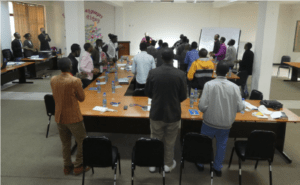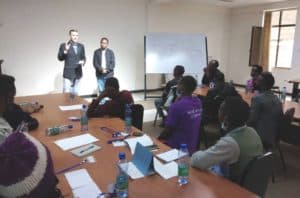Recently, I was reminded by a colleague that our work here in Ethiopia must be more about the process than the end goal. “But Rob,” you might be thinking, “isn’t your goal rather straightforward? Isn’t it simply to translate the Bible into as many languages as possible?” No, that is not the goal of our work. Our goal is to see people transformed by the Word of God. Simply handing them a Bible doesn’t make that happen.

This is why it is so vitally important to remember that the process is more important than the goal. How we minister to people, as we journey, is more transformational than the end product (which at times has simply been left on the shelf).
Let me tell you a story that illustrates this principle. Last week I was invited to say a few words at the closing ceremony of an Oral Bible Storytelling (OBS) workshop. There were four language communities from southern Ethiopia represented: the Bench, the Dizi, the Kafa, and the Sheko. This ceremony marked the end of their fourth two-week training session. The workshops are designed to train both lay and formal church members to leverage the strength of their oral culture to use Bible stories to minister to their local communities.
Several months ago, during their second workshop, the OBS teams learned the story of Jesus healing the Roman centurion’s servant (Matthew 8:5-13). After returning to their local communities and being motivated by this story, several Kafa church workers planted a church. The most incredible part of this story is who the church was planted among.
Touching the “untouchables”
Unknown to us, living among the Kafa and the Dizi language communities is another ethnic group, the Menja. Like the “untouchables” of India, they are severely marginalized and treated as a lower class of people. However, when the Kafa ministers who attended the workshops were reminded of how Jesus reached out to the Roman centurion, they were spurred to reach out to their own cultural “untouchables.”

During the closing ceremony, I heard one of the Menja participants explain how he has been transformed by the love shown by the Kafa ministers who had reached out and planted a church among his people. He felt, for the first time, that he was being treated as an equal.
If the Kafa church ministers had simply stuck to the original plan and only ministered to their own community, they would not have been motivated to open their eyes to a whole other cultural group that has so often been ignored in the past.
When we have ministry “goals” we must not trample people along the way to meeting them. It’s about the process. It’s about walking together.
Story by Rob Bustin

